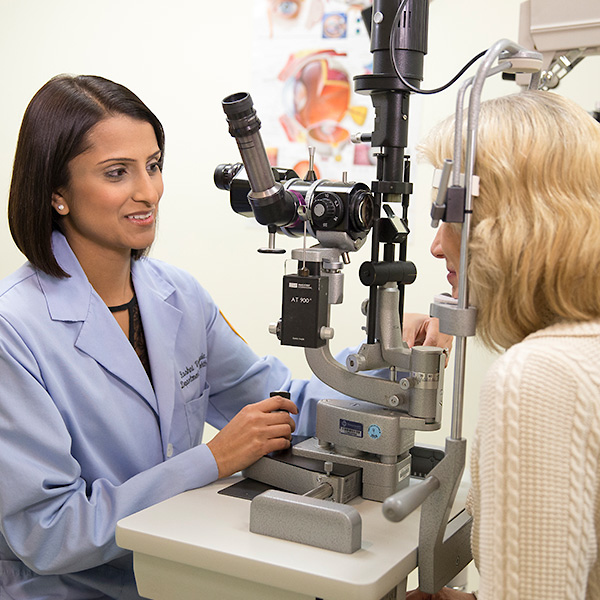Low Vision and Vision Rehabilitation
Advanced Clinical Care for Low Vision and Vision Rehabilitation
Loyola Medicine offers comprehensive care for patients with low vision or those needing vision rehabilitation. Our dedicated team of doctors, surgeons, rehabilitation specialists and nurses will provide expert care and address any questions and concerns that you may have.
Patients with low vision experience a reduction in sight that affects the ability to complete everyday tasks such as reading, driving, shopping, writing and recognizing faces. We understand that this can have a significant impact on your quality of life.
Low vision can be the result of cataracts, macular degeneration, diabetic retinopathy, glaucoma or other eye conditions. These issues can be treated with help from an ophthalmologist. However, many patients with low vision do not benefit from medical treatment and have more success with vision rehabilitation with help from an optometrist.
Loyola’s ophthalmology team offers a wide range of comprehensive eye care services. Our board-certified ophthalmologists and licensed optometrists provide diagnostic services and personalized treatment for adults and children in all ophthalmic subspecialties. Our ophthalmology department uses the most current, state-of-the-art equipment and procedures.
Why Choose Loyola for Low Vision and Vision Rehabilitation
The department of ophthalmology at Loyola Medicine offers a co-management care program, as recommended by the National Eye Institute, to address medical and rehabilitation issues in the best interests of people with vision loss.
Our approach is to provide expert medical treatment for patients with vision loss. When vision loss cannot be avoided, we offer a comprehensive program of rehabilitation that can return independence and well-being.
Types of Low Vision
Low vision can be caused by medically treatable eye conditions such as:
- Cataracts
- Macular degeneration
- Diabetic retinopathy
- Glaucoma
- Stargardt's macular dystrophy
- Albinism
- Retinopathy of prematurity
- Stroke
- Congenital cataracts
- Aniridia
- Diplopia
However, some instances of low vision are unrelated to another eye disorder. These include:
- Loss of central vision
- Loss of peripheral (side) vision
- Blurred vision
- Generalized haze
- Extreme light sensitivity
- Night blindness
Medical Treatment of Low Vision and Vision Rehabilitation
To address your low vision issues, our ophthalmologists perform comprehensive vision examinations in order to fully understand your visual limitations.
Treatment plans depend on the underlying cause of your low vision. Eye disorders such as macular degeneration, glaucoma and cataracts are treatable and relief is achievable with a customized plan developed by your doctor. Typical treatments for these disorders include injectable medicines, surgery and prescription eye drops.
Some low vision issues are not medically treatable, but they can be addressed to improve your quality of life through rehabilitation and low vision aids.
Rehabilitation Services for Low Vision and Vision Rehabilitation
If the cause of your low vision cannot be medically treated, you have the option to make living adjustments with help from a licensed optometrist. We offer prescriptive devices, adaptive tools and training to ensure you are able to perform everyday activities to the best of your ability.
Our rehabilitation approach teaches patients to maximize remaining vision, learn what prescriptive tools/access technologies can help and what training is needed.
Low vision aids work by either making things bigger and brighter or by allowing you to rely more on audio and hearing to make your everyday life easier.
Our goal is to adjust your home and work environments so that you are more comfortable performing daily tasks and enjoying life while living with low vision. We are committed to helping you regain confidence, learn how to cope with vision loss and return to your active lifestyle.

Request an Appointment
Whether you are seeking routine eye care or have a specific vision issue, our team treats a wide range of eye diseases and conditions, including cataracts, glaucoma, macular degeneration and strabismus. Schedule an appointment today.
Schedule a Telehealth Appointment
